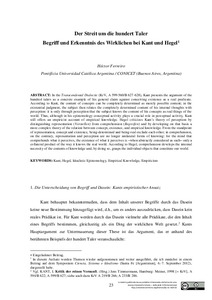Por favor, use este identificador para citar o enlazar este ítem:
https://repositorio.uca.edu.ar/handle/123456789/12415| Título: | Der streit um die hundert taler: begriff und erkenntnis des wirklichen bei Kant und Hegel | Autor: | Ferreiro, Héctor Alberto | Palabras clave: | Kant, Immanuel, 1724-1804; Hegel, Georg Wilhelm Friedrich, 1770-1831; EMPIRISMO; EPISTEMOLOGIA; IDEALISMO | Fecha de publicación: | 2016 | Editorial: | Sociedade Hegel Brasileira | Cita: | Ferreiro, H. A. Der streit um die hundert taler: begriff und erkenntnis des wirklichen bei Kant und Hegel [en línea]. Revista Eletrônica de Estudos Hegelianos. 2016, 13 (21). Disponible en: https://repositorio.uca.edu.ar/handle/123456789/12415 | Resumen: | Abstract: In the Transcendental Dialectic (KrV, A 599-560/B 627-628), Kant presents the argument of the hundred talers as a concrete example of his general claim against conceiving existence as a real predicate. According to Kant, the content of concepts can be completely determined as merely possible content; in the existential judgment, the subject then relates the completely determined content of his internal thoughts with perception: it is only through perception that the subject knows the content of his concepts as real things of the world. Thus, although in his epistemology conceptual activity plays a crucial role in perceptual activity, Kant still offers an empiricist account of empirical knowledge. Hegel criticizes Kant´s theory of perception by distinguishing representation (Vorstellen) from comprehension (Begreifen) and by developing on that basis a more complex theory of the relation between concept, existence, and empirical knowledge. From the standpoint of representation, concept and existence, being-determined and being-real exclude each other; in comprehension, on the contrary, representation and perception are no longer unilateral forms of knowing: for the mind that comprehends what it perceives, the existence of what it perceives is –when abstractly considered as such– only a collateral product of the way it knows the real world. According to Hegel, comprehension develops the internal necessity of the contents of knowledge and, by doing so, grasps the individual objects that constitute our world. | URI: | https://repositorio.uca.edu.ar/handle/123456789/12415 | ISSN: | 1980-8372 | Disciplina: | FILOSOFIA | Derechos: | Acceso abierto | Fuente: | Revista Eletrônica de Estudos Hegelianos Año13, No. 21, 2016 |
| Aparece en las colecciones: | Artículos |
Ficheros en este ítem:
| Fichero | Descripción | Tamaño | Formato | |
|---|---|---|---|---|
| der-treit-die-hundert.pdf | 496,47 kB | Adobe PDF |  Visualizar/Abrir |
Visualizaciones de página(s)
52
comprobado en 27-abr-2024
Descarga(s)
59
comprobado en 27-abr-2024
Google ScholarTM
Ver en Google Scholar
Este ítem está sujeto a una Licencia Creative Commons

